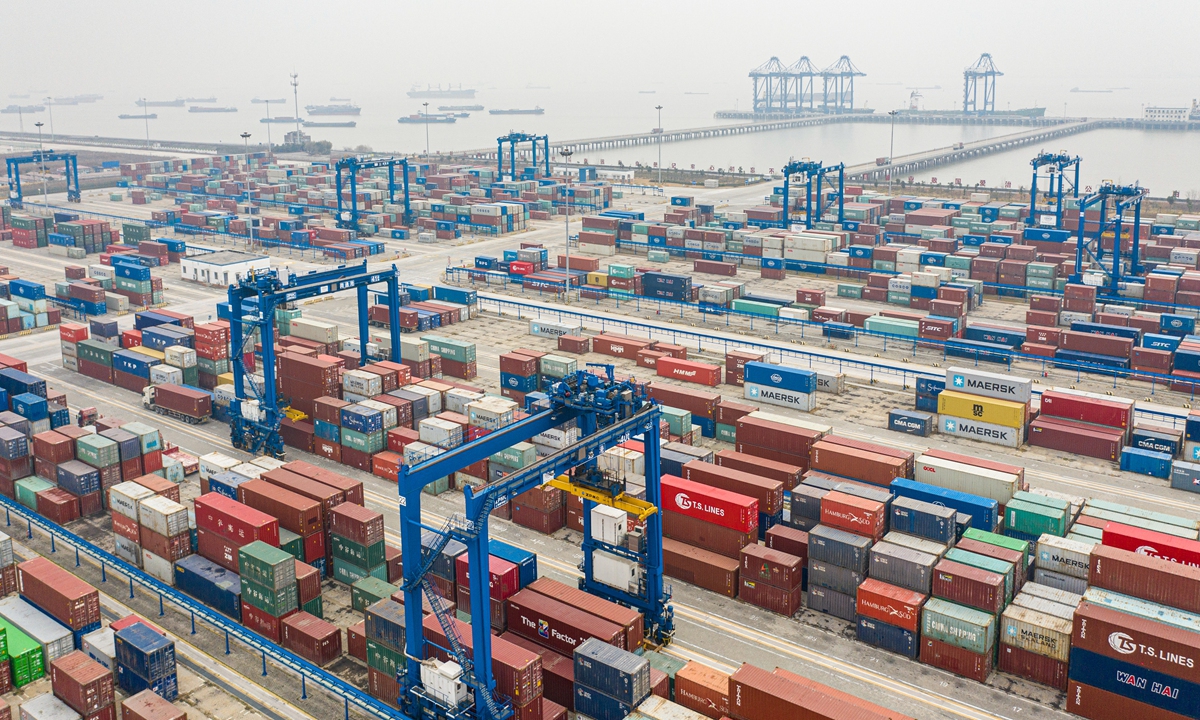
Containers are handled at the Port of Nantong in East China's Jiangsu Province on January 9, 2022. Photo: cnsphoto
European businesses groups generally hold greater expectations of market opportunities and business ties in China, as they keep watchful eyes on a wide range of topics, including carbon emissions reduction, innovation, anti-epidemic efforts and economic stimulus, at the ongoing two sessions in Beijing.
Two sessions, namely the annual sessions of the National People's Congress, the top legislature, and the National Committee of the Chinese People's Political Consultative Conference, the top political advisory body, are a window to observe China's social and economic development priorities for the year and beyond.
The European Union Chamber of Commerce (EUCCC) will keep a very close eye on the two sessions, since these meetings will signal the direction that China will take for the rest of the year, and the outcomes will have a significant impact on business confidence, a spokesperson with the European Union Chamber of Commerce in China (EUCCC) told the Global Times over the weekend.
China has experienced phenomenal economic growth since embarking on a program of reform and opening-up some 40 years ago, which was then boosted as part of its WTO accession, the EUCCC said.
European enterprises have great anticipation of being part of China's continued development, especially when it comes to the carbon emissions peaking and carbon neutrality targets that the country has set.
"For example, there is huge potential for EU-China collaboration on combating climate change, so the Chamber hopes to see a timeline for the roll-out of China's '1+N' policy framework [for carbon peaking and carbon neutrality]," the EUCCC said.
The European Chamber's Business Confidence Survey 2021 showed that many European companies are eager to increase their investment in China, not only because of the growth potential of the Chinese economy, but it also allows them to stay competitive in the Chinese market.
While the chamber stated that many European companies experience regulatory barriers, it highlighted "the clear opportunities for synergies and further cooperation, given European and Chinese companies' complementary expertise" should the barriers be further reduced.
"For example, in terms of R&D activities, European companies excel in industrial innovation, while China's innovation is chiefly at the consumer end of value chains, providing clear scope for both sides to learn from one another and add value," the EUCCC said.
The British Chamber of Commerce is also holding high expectations of stronger business ties with the Chinese market.
Speaking with the Global Times on Friday, Julian MacCormac, chair of the British Chamber of Commerce in China, said that he expects this year's two sessions to focus on the government's plan to strengthen support to the economy amid slowed economic growth and concerns around COVID-19 and the property market.
"We'd like to understand how COVID-19 will be handled this year and if restrictions will loosen on entry into China," MacCormac said, extending his hope to see clearer policy indications on common prosperity and the government's plan to further support sectors affected by COVID-19 such as retail, catering and hospitality, and civil aviation.
Policy priorities around carbon emissions reduction for 2021, including power market reform and the development of renewables, will also be closely watched and the British chamber hopes that the Chinese government will continue to create opportunities for foreign companies to increase their involvement in the process.
British companies report that despite concerns about the China-UK political relationship, they remain firm in their commitment to the Chinese market, regardless of geopolitical tensions, according to the British Chamber of Commerce in China.
In this year's British Chamber of Commerce in China Business Sentiment Survey, 85 percent of companies stated that they intend to maintain or increase their investment in China during 2022.
"That is not to say that there are no challenges, but we anticipate that in light of British businesses' ongoing confidence in trading with China, trade ties will remain strong despite an increasingly complex global outlook," MacCormac said.

